When Silence Costs in Engineering and Maintenance
At MCP, we often see that the biggest challenges in engineering and maintenance aren’t caused by equipment — they’re caused by the way people communicate around it.
Kevin Sullivan, one of our experienced consultants, has spent years working with organisations where reliability depends just as much on behaviour as it does on systems and tools. His work repeatedly shows that when communication falters, risk quietly multiplies.
In this piece, Kevin reflects on a pattern he has observed across many engineering and maintenance environments: when people hesitate to speak up, issues grow unseen. And when culture encourages clarity and candour, reliability improves long before new systems are introduced.
What follows is Kevin’s insight into how silence, hierarchy and habit shape engineering performance — and how organisations can shift those behaviours to strengthen safety, reliability and day-to-day operations.
Kevin’s Introduction
When I first read Chapter 7 of Malcolm Gladwell’s Outliers, I expected a story about aviation safety. What I didn’t expect was a mirror held up to every engineering organisation I’ve ever worked with.
Gladwell’s chapter, “The Ethnic Theory of Plane Crashes,” explores how Korean Air went from one of the world’s most dangerous airlines to one of its safest. It’s a powerful reminder that in complex operations, technology rarely fails on its own — people do, when culture silences them.
The Hidden Cost of Deference
In the 1990s, Korean Air had an alarming accident rate. Their aircraft were sound. Their pilots were competent. Their maintenance practices were broadly compliant. So, what was going wrong?
The answer, as Gladwell shows, lay not in the technical but in the cultural. South Korea’s heritage is steeped in Confucian hierarchy — respect for elders, teachers, and authority figures is seen as virtue. Yet that same virtue can become fatal in the cockpit of a modern jet, where two professionals must speak as equals when something goes wrong.
On the cockpit voice recorders, investigators heard the same pattern again and again: the first officer hinting at danger rather than stating it outright.
Instead of saying “Captain, we must climb — now,” they’d say, “Perhaps the weather radar is helping us a lot.”
That small layer of politeness — what Gladwell calls mitigated speech — was enough to kill everyone on board.
No mechanical failure. No incompetence. Just hesitation, hierarchy and human habit.
When Culture Becomes the Root Cause
What made Korean Air remarkable wasn’t its mistakes, but its willingness to look inward. They realised their issue wasn’t technical at all — it was cultural. And cultural problems are the hardest to fix because they live inside people’s heads and habits.
The airline made bold moves:
They retrained every crew member in Crew Resource Management, flattening hierarchy and encouraging assertive communication.
They changed the cockpit language to English — a symbolic reset that stripped away embedded deference.
They partnered with Delta Air Lines and other Western carriers to embed new ways of thinking about equality and communication.
Within a few years, Korean Air’s safety record was world-class. The same people, the same planes, the same procedures — only the culture had changed. That transformation is a perfect metaphor for every high-risk, asset-intensive industry I’ve encountered. The lesson is simple but profound:
A culture that silences truth will always sabotage performance.
Echoes in Engineering and Maintenance
I’ve seen Korean Air’s story play out again and again — not in the sky, but on the factory floor, in maintenance planning rooms and within engineering teams.
A technician notices a bearing running hot but hesitates to speak because “the supervisor won’t want to hear it.”
A planner spots a scheduling clash but keeps quiet because “that’s how we’ve always done it.”
A manager suspects a near miss has gone unreported but decides not to stir the pot.
No single act brings the system down — but over time, those silences line up like holes in Swiss cheese until the inevitable happens. The post-incident report then reads: “Communication failure.”
But “communication failure” isn’t the problem. It’s a symptom. The real problem is cultural fear — fear of embarrassment, fear of being wrong, fear of upsetting authority. That’s what Korean Air dismantled and that’s what every organisation aiming for operational excellence must confront.
Engineering Reliability Starts with Behaviour
In maintenance and asset management, we spend enormous effort engineering out variability. We build systems, procedures, digital workflows, and KPIs — and they’re all essential. But none of them matter if people don’t feel safe to speak up when something looks wrong.
Reliability isn’t just mechanical; it’s behavioural.
A healthy culture allows tension to surface early — before it becomes downtime, rework, or a headline.
The best leaders I’ve worked with understand this. They don’t reward blind compliance; they reward constructive challenge. They create what Amy Edmondson calls psychological safety - an environment where curiosity and candour are not only permitted but expected. That’s not a “soft skill.” It’s a strategic asset.
Turning Silence into Strength
Korean Air’s recovery shows what’s possible when an organisation stops defending its past and starts designing its future. It’s the same journey any engineering or maintenance organisation must take if it wants to move from reactive firefighting to world-class reliability.
It starts with questions like:
Are our teams empowered to challenge decisions, regardless of hierarchy?
Do we train people in how to speak up, not just how to do the job?
Do our systems encourage honest feedback — or punish it?
Every business says it values safety and reliability. But the truth is found not in slogans, but in how people behave when things start to go wrong.
The Real Outlier
Gladwell called Korean Air an outlier because it transformed its destiny by changing its culture. The airline proved that legacy is not destiny — it’s just the starting point.
In our own industry, the same applies. Whether you manage aircraft or assets, the laws of reliability are universal: technology amplifies culture. If your culture is healthy, technology multiplies your strength. If it isn’t, technology multiplies your mistakes.
The world doesn’t need more systems. It needs more truth — spoken clearly, at the right moment, by people who feel safe to speak it.
That’s how planes stay in the air.
And that’s how great organisations stay alive.
Join our Webinar
Strengthening reliability isn’t just a technical exercise. As Kevin highlights, it’s about creating an environment where people feel able to raise concerns early, challenge constructively, and communicate without hesitation. That behavioural shift is often the turning point for teams looking to move from reactive firefighting to consistent, confident performance.
For organisations exploring how to guide their teams through meaningful behavioural and cultural change, MCP is hosting a webinar led by Dr Reinhard Korb. The session focuses on managing change within engineering and manufacturing environments — helping teams adapt, communicate more effectively and embed new ways of working.
You can read more here:
Change Management Webinar – MCP Technical Training & Consulting






